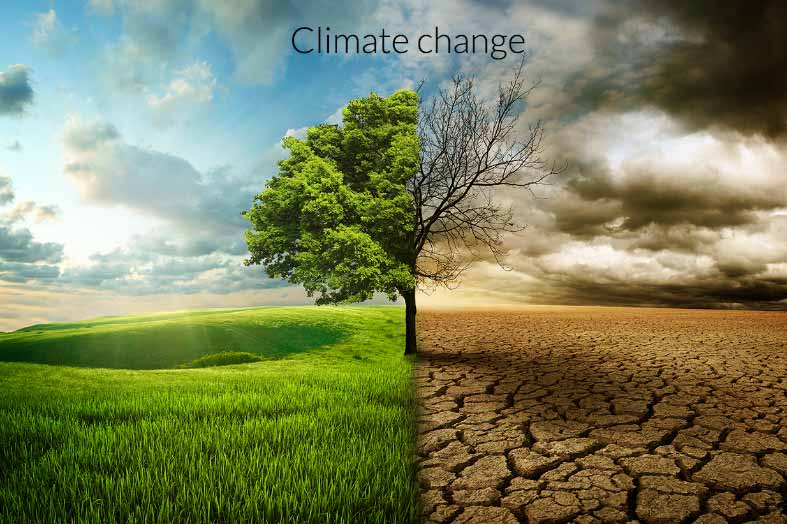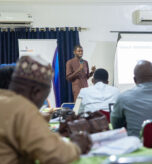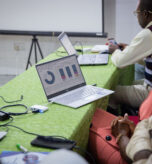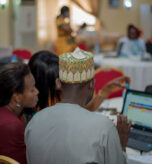As the impacts of climate change become increasingly evident worldwide, it is crucial for countries to take swift and decisive action to mitigate their effects. Nigeria, in particular, is at a critical juncture in its fight against climate change. Despite making significant commitments to reducing its carbon footprint, Nigeria faces the mammoth challenge of translating these commitments into concrete actions on the ground.
Nigeria’s unique geopolitical and socioeconomic landscape makes the outlook of the climate change problem in the country more complex. For instance, the security issues caused by increasing violence, conflicts, and communal clashes; the poor provision of social services across sectors; and the environmental stress resulting from storm surges, inland flooding and wildfires along the coastal states, negative rainfall anomalies, and flooding in the middle belt, and chronic aridity and riverine flooding in the north, all severely limit the country’s ability to respond to its considerable climate challenges [1].
A recent USAID Climate Exposure Report reveals that Nigeria has over 41 million people, representing 24 per cent of its population, living in high-climate exposure areas, with 4.5 million living in areas with very high climate exposure [2]. According to the EM-DAT International Disasters Database, Nigeria experienced over 40 climate-related disasters between 2000 and 2016, [3] with floods in 2010 and 2012 killing or affecting the largest numbers of people [4].
Also, despite submitting the final updated Nationally Determined Contribution (NDC) to the UN Framework Convention on Climate Change in July 2021, Nigeria has yet to fully implement the necessary policy recommendations and well-articulated strategies it contains. This was evident in the devastating impact of climate change witnessed across the nation in 2022, where whole communities were flooded, roads washed away, and businesses across major cities nationwide were shut down for days.
Nigeria’s demographic reality further complicates its vulnerability to climate change. As Africa’s largest economy and the most populous black nation globally, Nigeria’s population is projected to reach over 400 million by 2050 [5]. With over 63% of its people living in poverty [6], it becomes extremely imperative that Nigeria takes the lead in implementing stronger climate change policies to improve resilience and mitigate the impact of climate-induced hazards.

To move from words to action, Nigeria must answer some critical questions, such as, “How can Nigeria invest her available resources most efficiently to mitigate the effect of climate-induced hazards?”, “How can the government set the agenda for progress and carry other key stakeholders along?”, “What important trade-offs need to be made to improve resilience and adaptation?”, “How can Nigeria integrate climate change considerations into its national development plans and policies?” This blog post outlines strategies that Nigeria can implement to strengthen its climate change policy and improve resilience as contained in the recently updated NDC.
It is extremely crucial for climate action in Nigeria to become fully mainstream and cut across all key aspects of sustainable development. The government must serve as the convening partner to galvanize all other stakeholders, such as the private sector, international partners, civil society organizations, and individuals. No true climate-resilient program or adaptation strategy can be effectively implemented without considering other key national priorities around sustainable development, including economic growth, national security, public health, nature protection and well-being, and education.
The latest update to the Nigerian climate change Nationally Determined Contribution highlights key areas where Nigeria can begin to deploy strategic action, five of these will be discussed next.
(a) Adaptation Strategies – One critical area is to develop and implement climate change adaptation strategies that reduce vulnerability and increase resilience across the board. For example, Nigeria can invest in infrastructure such as flood-resistant housing, water management systems, and sustainable transport. Global best practices, such as those implemented in Sweden, can serve as a model for Nigeria. Sweden has policies that encourage the use of public transportation, cycling, and walking, which reduce the use of private cars [7]. Nigeria can promote sustainable transport by investing in infrastructure and policies that encourage these cleaner modes of transportation.
(b) Transition to Renewable Energy Sources – Another key area where Nigeria can act is by transitioning to renewable energy sources. Despite being blessed with abundant sunshine, wind, and other renewable energy sources, the vast majority of Nigeria’s energy comes from fossil fuels. By investing in renewable energy infrastructure, Nigeria can reduce its carbon emissions, create new jobs, and stimulate economic growth. Denmark for instance is a global leader in renewable energy, with more than half of its energy coming from wind power [8]. Nigeria relies heavily on oil and can learn from Denmark’s focus on renewable energy to reduce greenhouse gas emissions and thus mitigate climate change.
(c) Improving Waste Management Systems – Nigeria can also improve its waste management systems, which generate significant amounts of greenhouse gas emissions. By implementing a comprehensive waste management system that includes recycling, composting, and waste-to-energy solutions, Nigeria can significantly reduce its carbon footprint.
(d) Promoting Sustainable Agriculture – The agriculture sector is a significant contributor to Nigeria’s economy, and sustainable agriculture practices can help reduce the sector’s carbon footprint. By promoting practices such as crop rotation, natural pest management, and reduced tillage, Nigeria will tow the path of countries like Ethiopia, Tanzania, and Norway which have made significant progress in implementing these climate-smart agricultural practices, which are designed to increase food production while reducing greenhouse gas emissions. For instance, Nigeria can learn from Norway’s focus on sustainable agriculture practices, such as conservation agriculture and agroforestry to bend the national emissions curve and drive [9].
(e) Strengthening Climate Change Policy Implementation Mechanisms – Finally, Nigeria must work to strengthen its climate change policy implementation mechanisms. This will require increased funding for climate change programs, as well as the establishment of clear targets and accountability mechanisms. Civil society organizations and the private sector must play a crucial role in holding the government accountable and ensuring that climate change policies are implemented effectively. Another key aspect is the need to invest in climate education. Denmark has implemented policies that prioritize climate education in schools and workplaces [10]. Nigeria can also promote climate education to raise awareness and empower citizens to take action on climate change. The government can also provide financial incentives to businesses and individuals who adopt sustainable practices.
These strategies are concrete steps towards a more sustainable future for Nigeria. Mitigating the impact of climate change will require concerted efforts from all stakeholders and a real commitment to making lasting changes. The country must rise swiftly to the occasion to mitigate the negative impacts of climate change or risk significant economic and social disruption in the years to come. The imperative of stronger climate change policy implementation in Nigeria cannot be overstated. It is the touchstone of our collective fight for a more sustainable and climate-resilient future.
References
1. USAID. 2012. Climate Change Adaptation Plan. Annex: Nigeria Climate Vulnerability Profile. Washington: USAID
2. Krishnan, Nisha, Joshua W. Busby, and Todd G. Smith. 2016. Territory-Based Metrics of Subnational Climate Exposure, Produced for USAID Office of Conflict Management and Mitigation. Austin: Robert Strauss Center for International Security and Law.
3. Guha-Sapir, Debarati, Regina Below, and Philippe Hoyois. 2017. EM-DAT: The CRED/OFDA International Disaster Database. Brussels: Université Catholique de Louvain.
4. Guha-Sapir, Debarati, Regina Below, and Philippe Hoyois. 2017. EM-DAT: The CRED/OFDA International Disaster Database. Brussels: Université Catholique de Louvain.
5. United Nations Population Fund Country programme document for Nigeria (2023) Retrieved from https://nigeria.unfpa.org/en/publications/united-nations-population-fund-country-programme-document-nigeria
6. Nigeria Bureau of Statistics. (2022 Multidimensional Poverty Index survey). https://nigerianstat.gov.ng/news/78#:~:text=Highlights%20of%20the%202022%20Multidimensional,quarter%20of%20all%20possible%20deprivations
7. Sweden’s Climate Policy Framework. Retrieved from https://www.government.se/articles/2021/03/swedens-climate-policy-framework/
8. Denmark.dk. Pioneers in Renewable Energy (2022). Retrieved from https://denmark.dk/innovation-and-design/clean-energy
9. Norway’s National Adaptation Plan (2013-2019). Retrieved from https://www.regjeringen.no/en/dokumenter/meld.-st.-33-20122013/id725930/
10. Denmark’s Voluntary National Review 2021. Retrieved from https://sustainabledevelopment.un.org/content/documents/279532021_VNR_Report_Denmark.pdf




